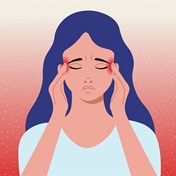A population-based study, for the first time, has found a connection between migraine and restless legs syndrome (RLS).
In a cohort of more than 30 000 women, migraine was associated with a significant 22% increased likelihood of RLS. The link to RLS was seen in migraine with or without aura. The relationship existed only in active migraine patients (not inactive migraine patients).
The study was published in Cephalalgia.
First author Dr Markus Schurks, of Brigham and Women's Hospital in Boston and University Hospital in Essen, Germany, said that doctors "should be aware of a potential association between migraine and RLS when treating patients with either condition. This may help guiding the physician in selecting the appropriate treatment."
Link between migraine and RLS
Dr Shuu-Jiun Wang, of the Neurological Institute, Taipei Veterans General Hospital and National Yang-Ming University School of Medicine, Taipei, Taiwan, who was not involved in the study, said: "This is the first population-based study to show the link between RLS and migraine in women (no men were included in this study). Most of these same findings were found in clinic- or hospital-based studies," Dr Wang noted.
Why the two disorders are connected is "not completely understood," Dr Wang added, "but shared mechanisms might explain both disorders (i.e. iron metabolism and dopaminergic pathway are disturbed in both disorders)."
Migraine and RLS are both common disorders predominantly affecting women, Dr Schurks and colleagues note in their report. However, epidemiologic evidence supporting an association between the two is lacking.
They investigated ties between migraine (including its subtypes) and RLS in 31 370 women participating in the Women's Health Study (WHS), a randomised trial designed to test the benefits and risks of low-dose aspirin and vitamin E in the primary prevention of cardiovascular disease and cancer.
Altogether, 6 857 women (21.9%) reported any migraine at baseline or during nine years of follow-up. That number included 1,579 women (23.0%) who had migraine with aura, 2 418 who had migraine without aura (35.2%), and 1,725 had prior migraine.
Women with any migraine had an age-adjusted odds ratio (OR) of 1.35. This association was attenuated when adjusting for multiple covariates, but remained statistically significant with an OR of 1.22.
The association was similar for migraine with aura and migraine without aura as well as for new reports of migraine during follow-up; the multivariable-adjusted ORs were 1.27, 1.24 and 1.30, respectively.
Prior migraine did not appear to be significantly associated with RLS (adjusted OR 1.11). "This may suggest that disease activity is important for the manifestation of comorbid RLS," the researchers say.
The effect of migraines
"Altogether our study is in line with the previous reports indicating that migraineurs are more likely to have RLS than non-migraineurs," they note. "However, our study is unique in terms of its large size and prospective design." Still, they say the study has its share of limitations, including self-reported migraine status and RLS diagnosis based on responses to a set of questions.
Another limitation is the composition of the cohort – white highly educated women aged 45 and younger – which may limit the generalizability of the findings. Nonetheless, the researchers say women in this age group are preferentially affected by RLS; "hence, our population is both relevant and ideal to investigate an association between migraine and RLS."
The investigators conclude, "Given the high prevalence and burden of both conditions, further research at the population level is warranted. Specific unanswered questions pertain to potential gender differences of the migraine-RLS link, whether severity of migraine has an impact on severity of RLS, and the underlying pathophysiology linking the two conditions."
The study was supported by a grant from the National Heart, Lung and Blood Institute. The authors report no conflicts of interest.
(Reuters Health, Megan Brooks, March 2012)
Read more:




 Publications
Publications
 Partners
Partners














